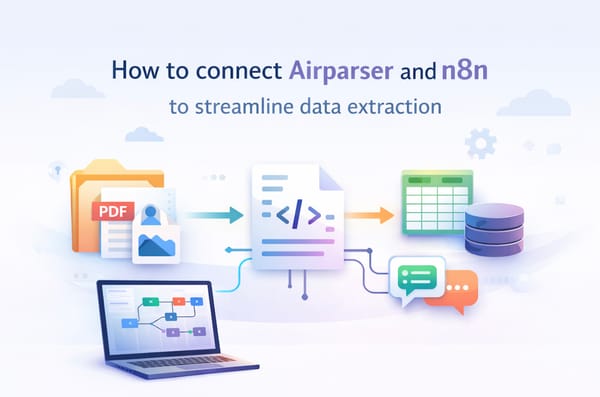Simplifying Logistics Operations with Automated Document Parsing
Simplify logistics operations with automated document parsing. Learn how Airparser can improve efficiency, reduce errors, and streamline your workflow

Efficient logistics operations are essential for any company dealing with the movement of goods. Whether it's managing shipments, tracking inventory, or processing orders, logistics involves a significant amount of paperwork. From packing lists to shipment notices, these documents are crucial for smooth operations. However, handling them manually can be time-consuming and prone to errors. This is where automated document parsing comes into play. In this article, we'll explore how automated document parsing can simplify logistics operations and why it's becoming an essential tool for modern logistics companies.
The Challenges in Logistics Document Management
Logistics companies handle a wide variety of documents daily. These include packing lists, shipment notices, invoices, bills of lading, and more. Each of these documents contains vital information needed for smooth operations. Traditionally, these documents are processed manually, which comes with several challenges.
Manual Processing Issues
Manual document processing is slow and inefficient. Employees must read through each document, identify key data points, and then enter this information into the logistics management system (LMS). This process is not only time-consuming but also prone to human error. A misplaced number or a missed detail can lead to costly mistakes, such as incorrect shipments or delayed deliveries.
Impact on Operations
When document processing is slow or inaccurate, it can have a ripple effect on the entire logistics operation. Delays in processing documents can lead to delays in shipments, which in turn affects customer satisfaction. Errors in data entry can cause issues with inventory management, leading to stock shortages or overages. Overall, the inefficiencies of manual document handling can significantly impact a company's bottom line.
What is Automated Document Parsing?
Automated document parsing is a technology that uses software to extract data from documents automatically. This technology can handle a wide range of document types and formats, making it ideal for logistics companies that deal with various paperwork.
How It Works
Document parsing tools, like Airparser, use technologies such as Optical Character Recognition (OCR) and AI-driven algorithms to read and extract data from documents. For example, an automated system can scan a shipment notice, identify key details like the shipment date, destination, and contents, and then automatically input this information into the LMS.
Benefits
The benefits of automated document parsing are clear. It reduces the time spent on manual data entry, improves accuracy, and allows logistics companies to process documents much faster. This, in turn, speeds up the entire logistics operation, from order processing to shipment tracking.

For more details on how document parsing technology works, you can check out our article on How to Extract Data from PDF Documents: A Comprehensive Guide.
How Automated Document Parsing Simplifies Logistics Operations
Automated document parsing can significantly streamline logistics operations by automating the most tedious and error-prone tasks.
Streamlining Document Handling
With automated parsing, logistics companies can handle a large volume of documents quickly and accurately. The system can automatically extract relevant data from documents like packing lists, shipment notices, and invoices, reducing the need for manual intervention. This means that employees can focus on more critical tasks, such as managing shipments and ensuring timely deliveries.
Integration with LMS
One of the most significant advantages of automated document parsing is its ability to integrate seamlessly with existing logistics management systems (LMS). By integrating a parsing tool like Airparser into your LMS, you can automate the flow of information from documents directly into your system. This ensures that all relevant data is captured accurately and promptly, improving overall efficiency.
For example, Airparser’s ability to handle multiple schemas allows it to adapt to various document types, making it easier for logistics companies to manage their documents without needing separate systems for different document formats. You can learn more about how multi-schema support can benefit logistics in our article on Zonal OCR vs GPT-Powered Data Extraction.
Real-World Examples
Consider a logistics company that receives hundreds of shipment notices daily. With automated document parsing, these notices can be processed in minutes instead of hours. The system can automatically extract details like shipment dates, destinations, and item descriptions, and input this information into the LMS. This speeds up the entire process, from shipment preparation to tracking and delivery.
Choosing the Right Document Parsing Tool
Not all document parsing tools are created equal. When selecting a tool for your logistics operation, it's essential to consider several key features.
Key Features to Look For
- Custom Schema Support: The ability to create and manage custom schemas is crucial for handling various document types.
- AI-Driven Classification: AI-driven classification helps in automatically identifying the type of document and applying the correct schema.
- Scalability: The tool should be able to scale with your business, handling increasing volumes of documents without sacrificing speed or accuracy.
Why Airparser?
Airparser is designed with the needs of logistics companies in mind. It offers robust features like custom schema support and AI-driven classification, making it a versatile tool for handling various document types. Whether you need to process packing lists, shipment notices, or invoices, Airparser can help streamline your operations and improve efficiency.
In addition, Airparser is continually evolving, with new features and improvements being added regularly. To learn more about how Airparser compares to other data extraction tools, you might want to read our article on Top Data Extraction Tools.

Future of Document Parsing in Logistics
The field of document parsing is rapidly evolving, with new technologies emerging that promise to make logistics operations even more efficient.
Emerging Trends
One of the most exciting trends in document parsing is the integration of AI and machine learning. These technologies allow document parsing tools to become more intelligent, learning from past documents to improve accuracy and speed over time. As these technologies continue to develop, we can expect document parsing tools to become even more effective in handling the complexities of logistics operations.
Continuous Improvement
At Airparser, we are committed to staying at the forefront of document parsing technology. We are continually improving our tools to meet the changing needs of our customers. Whether it's adding new features or improving existing ones, we are always looking for ways to help logistics companies operate more efficiently.
Conclusion
Automated document parsing is a powerful tool that can significantly simplify logistics operations. By reducing the time and effort required to process documents, it allows logistics companies to operate more efficiently, reduce errors, and improve overall productivity.
If you're looking for a way to streamline your logistics operations, consider integrating a document parsing tool like Airparser into your workflow. With its robust features and easy integration, Airparser can help you manage your documents more effectively and improve your overall logistics process.
For more information on how Airparser can benefit your logistics operations, visit our blog or contact us directly.




